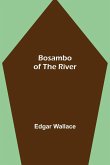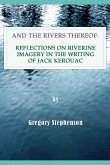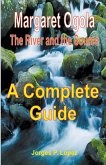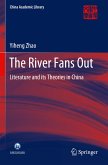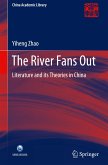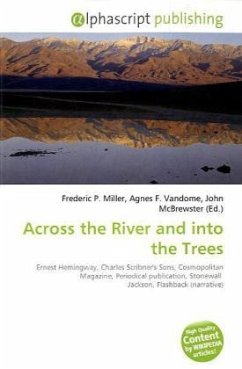River Fiction of India
Intersectional Flows of Narratives, Geographies, and Histories
Herausgeber: Ray, Subhadeep
River Fiction of India
Intersectional Flows of Narratives, Geographies, and Histories
Herausgeber: Ray, Subhadeep
- Gebundenes Buch
- Merkliste
- Auf die Merkliste
- Bewerten Bewerten
- Teilen
- Produkt teilen
- Produkterinnerung
- Produkterinnerung
This book establishes river fiction as an identifiable genre-fiction. It argues that rivers and riverbeds - through myths and legends, ecological and environmental concerns, geographical and historical realities, politics and economics around them - can provide an underlying framework to understand Indian prose fiction.
Andere Kunden interessierten sich auch für
![Bosambo of the River Bosambo of the River]() Edgar WallaceBosambo of the River19,99 €
Edgar WallaceBosambo of the River19,99 €![Canal and River Engineering: Being the Article Inland Navigation, From the Eighth Edition of the Encyclopaedia Britannica Canal and River Engineering: Being the Article Inland Navigation, From the Eighth Edition of the Encyclopaedia Britannica]() David StevensonCanal and River Engineering: Being the Article Inland Navigation, From the Eighth Edition of the Encyclopaedia Britannica29,99 €
David StevensonCanal and River Engineering: Being the Article Inland Navigation, From the Eighth Edition of the Encyclopaedia Britannica29,99 €![AND THE RIVERS THEREOF AND THE RIVERS THEREOF]() Gregory StephensonAND THE RIVERS THEREOF11,99 €
Gregory StephensonAND THE RIVERS THEREOF11,99 €![Margaret Ogola The River and the Source Margaret Ogola The River and the Source]() Jorges P. LopezMargaret Ogola The River and the Source16,99 €
Jorges P. LopezMargaret Ogola The River and the Source16,99 €![The River Fans Out The River Fans Out]() Yiheng ZhaoThe River Fans Out38,99 €
Yiheng ZhaoThe River Fans Out38,99 €![The River Fans Out The River Fans Out]() Yiheng ZhaoThe River Fans Out38,99 €
Yiheng ZhaoThe River Fans Out38,99 €![Across the River and into the Trees Across the River and into the Trees]() Across the River and into the Trees23,99 €
Across the River and into the Trees23,99 €-
-
-
This book establishes river fiction as an identifiable genre-fiction. It argues that rivers and riverbeds - through myths and legends, ecological and environmental concerns, geographical and historical realities, politics and economics around them - can provide an underlying framework to understand Indian prose fiction.
Produktdetails
- Produktdetails
- Verlag: Routledge India
- Seitenzahl: 306
- Erscheinungstermin: 31. März 2025
- Englisch
- Abmessung: 240mm x 161mm x 21mm
- Gewicht: 625g
- ISBN-13: 9781032662534
- ISBN-10: 1032662530
- Artikelnr.: 72107312
- Herstellerkennzeichnung
- Libri GmbH
- Europaallee 1
- 36244 Bad Hersfeld
- gpsr@libri.de
- Verlag: Routledge India
- Seitenzahl: 306
- Erscheinungstermin: 31. März 2025
- Englisch
- Abmessung: 240mm x 161mm x 21mm
- Gewicht: 625g
- ISBN-13: 9781032662534
- ISBN-10: 1032662530
- Artikelnr.: 72107312
- Herstellerkennzeichnung
- Libri GmbH
- Europaallee 1
- 36244 Bad Hersfeld
- gpsr@libri.de
Subhadeep Ray is an Associate Professor of English at Bidhan Chandra College, Asansol, West Bengal, India, and a Visiting Professor of English at Kazi Nazrul University, Asansol, West Bengal, India.
Acknowledgements
Foreword
Introduction: Reading the Indian river fiction: Generic movements and
intersectional approaches
PART I: NARRATIVES
1 A tale of woe and displacement: Brahmaputra as the perpetual perpetrator
in Rudrani Sarma's
2 The river bound humans: Narrative deployment of the river in delineating
limitations of human worlds in select Bengali short-fiction
3 Living with the river: Analysing aspects of vulnerability and
human-nonhuman relationship in The Boatman of the Padma and The Ganga
4 "Those who live beside the river need to be alarmed around the year":
Women across rivers in Tarashankar Bandyopadhyay's The Tale of Hansuli Turn
and Kalindi
5 River as the pathway to performative masculine identity: A reading of
Atin Bandyopadhyay's Ekti Joler Rekha O Ora Tin Jon
6 River, cityscape and crime: Navigating the Ganges in Satyajit Ray's Joi
Baba Felunath and Golapi Mukta Rahasya
PART II: GEOGRAPHIES
7 Reading river rites and river resilience in Naga Anglophone novels: An
attempt to restore indigenous river rights
8 Separating the waters: Analysing the Partition's impact upon Bengal's
rivers and chars through select Bengali 'hydro-fiction'
9 Dammed or doomed rivers?: Interrogating the other side of modernisation
and reclaiming the displaced riverine communities' narratives through Anita
Agnihotri's Mahanadi: The Tale of a River and Mahakantar
10 "What was once a rushing torrent, has become a broad river!":
Reflections onviolation of socio-ecological justice in Orijit Sen's River
of Stories and Sarnath Banerjee's All Quiet in Vikaspuri
11 "Through the holes in her ears, you could see the hot river and the dark
trees that bent to It": En-visioning the river as a subject and tracing the
poetics of environmental imagination in The God of Small Things
PART III: HISTORIES
12 Mapping the unknown: An exploration into the challenges of knowledge
acquisition in Major James Rennell's The Journals
13 A portrait of the artist as a riverine fellow: Journey of the self
through natural and community history in Subarnarenu Subarnarekha
14 The flowing of the river brings the promise of eternity: Reading
Ichamati and river narratives of the Sundarbans
15 The anonymous history of her banks is the living truth: A comparative
study of ecology, community and gender in Adwaita Mallabarman's Titas Ekti
Nadir Naam and Harishankar Jaladas' Jalaputra
16 From labour as legacy to labour as commodity: Reflections from Debesh
Ray's Tista novels
17 Ravaged hinterlands of central India: Capitalism and ecological
appropriation in Anita Agnihotri's Mahanadi: The Tale of a River
Afterword: An author's perspective: Reinventing a tradition while writing
within it
Foreword
Introduction: Reading the Indian river fiction: Generic movements and
intersectional approaches
PART I: NARRATIVES
1 A tale of woe and displacement: Brahmaputra as the perpetual perpetrator
in Rudrani Sarma's
2 The river bound humans: Narrative deployment of the river in delineating
limitations of human worlds in select Bengali short-fiction
3 Living with the river: Analysing aspects of vulnerability and
human-nonhuman relationship in The Boatman of the Padma and The Ganga
4 "Those who live beside the river need to be alarmed around the year":
Women across rivers in Tarashankar Bandyopadhyay's The Tale of Hansuli Turn
and Kalindi
5 River as the pathway to performative masculine identity: A reading of
Atin Bandyopadhyay's Ekti Joler Rekha O Ora Tin Jon
6 River, cityscape and crime: Navigating the Ganges in Satyajit Ray's Joi
Baba Felunath and Golapi Mukta Rahasya
PART II: GEOGRAPHIES
7 Reading river rites and river resilience in Naga Anglophone novels: An
attempt to restore indigenous river rights
8 Separating the waters: Analysing the Partition's impact upon Bengal's
rivers and chars through select Bengali 'hydro-fiction'
9 Dammed or doomed rivers?: Interrogating the other side of modernisation
and reclaiming the displaced riverine communities' narratives through Anita
Agnihotri's Mahanadi: The Tale of a River and Mahakantar
10 "What was once a rushing torrent, has become a broad river!":
Reflections onviolation of socio-ecological justice in Orijit Sen's River
of Stories and Sarnath Banerjee's All Quiet in Vikaspuri
11 "Through the holes in her ears, you could see the hot river and the dark
trees that bent to It": En-visioning the river as a subject and tracing the
poetics of environmental imagination in The God of Small Things
PART III: HISTORIES
12 Mapping the unknown: An exploration into the challenges of knowledge
acquisition in Major James Rennell's The Journals
13 A portrait of the artist as a riverine fellow: Journey of the self
through natural and community history in Subarnarenu Subarnarekha
14 The flowing of the river brings the promise of eternity: Reading
Ichamati and river narratives of the Sundarbans
15 The anonymous history of her banks is the living truth: A comparative
study of ecology, community and gender in Adwaita Mallabarman's Titas Ekti
Nadir Naam and Harishankar Jaladas' Jalaputra
16 From labour as legacy to labour as commodity: Reflections from Debesh
Ray's Tista novels
17 Ravaged hinterlands of central India: Capitalism and ecological
appropriation in Anita Agnihotri's Mahanadi: The Tale of a River
Afterword: An author's perspective: Reinventing a tradition while writing
within it
Acknowledgements
Foreword
Introduction: Reading the Indian river fiction: Generic movements and
intersectional approaches
PART I: NARRATIVES
1 A tale of woe and displacement: Brahmaputra as the perpetual perpetrator
in Rudrani Sarma's
2 The river bound humans: Narrative deployment of the river in delineating
limitations of human worlds in select Bengali short-fiction
3 Living with the river: Analysing aspects of vulnerability and
human-nonhuman relationship in The Boatman of the Padma and The Ganga
4 "Those who live beside the river need to be alarmed around the year":
Women across rivers in Tarashankar Bandyopadhyay's The Tale of Hansuli Turn
and Kalindi
5 River as the pathway to performative masculine identity: A reading of
Atin Bandyopadhyay's Ekti Joler Rekha O Ora Tin Jon
6 River, cityscape and crime: Navigating the Ganges in Satyajit Ray's Joi
Baba Felunath and Golapi Mukta Rahasya
PART II: GEOGRAPHIES
7 Reading river rites and river resilience in Naga Anglophone novels: An
attempt to restore indigenous river rights
8 Separating the waters: Analysing the Partition's impact upon Bengal's
rivers and chars through select Bengali 'hydro-fiction'
9 Dammed or doomed rivers?: Interrogating the other side of modernisation
and reclaiming the displaced riverine communities' narratives through Anita
Agnihotri's Mahanadi: The Tale of a River and Mahakantar
10 "What was once a rushing torrent, has become a broad river!":
Reflections onviolation of socio-ecological justice in Orijit Sen's River
of Stories and Sarnath Banerjee's All Quiet in Vikaspuri
11 "Through the holes in her ears, you could see the hot river and the dark
trees that bent to It": En-visioning the river as a subject and tracing the
poetics of environmental imagination in The God of Small Things
PART III: HISTORIES
12 Mapping the unknown: An exploration into the challenges of knowledge
acquisition in Major James Rennell's The Journals
13 A portrait of the artist as a riverine fellow: Journey of the self
through natural and community history in Subarnarenu Subarnarekha
14 The flowing of the river brings the promise of eternity: Reading
Ichamati and river narratives of the Sundarbans
15 The anonymous history of her banks is the living truth: A comparative
study of ecology, community and gender in Adwaita Mallabarman's Titas Ekti
Nadir Naam and Harishankar Jaladas' Jalaputra
16 From labour as legacy to labour as commodity: Reflections from Debesh
Ray's Tista novels
17 Ravaged hinterlands of central India: Capitalism and ecological
appropriation in Anita Agnihotri's Mahanadi: The Tale of a River
Afterword: An author's perspective: Reinventing a tradition while writing
within it
Foreword
Introduction: Reading the Indian river fiction: Generic movements and
intersectional approaches
PART I: NARRATIVES
1 A tale of woe and displacement: Brahmaputra as the perpetual perpetrator
in Rudrani Sarma's
2 The river bound humans: Narrative deployment of the river in delineating
limitations of human worlds in select Bengali short-fiction
3 Living with the river: Analysing aspects of vulnerability and
human-nonhuman relationship in The Boatman of the Padma and The Ganga
4 "Those who live beside the river need to be alarmed around the year":
Women across rivers in Tarashankar Bandyopadhyay's The Tale of Hansuli Turn
and Kalindi
5 River as the pathway to performative masculine identity: A reading of
Atin Bandyopadhyay's Ekti Joler Rekha O Ora Tin Jon
6 River, cityscape and crime: Navigating the Ganges in Satyajit Ray's Joi
Baba Felunath and Golapi Mukta Rahasya
PART II: GEOGRAPHIES
7 Reading river rites and river resilience in Naga Anglophone novels: An
attempt to restore indigenous river rights
8 Separating the waters: Analysing the Partition's impact upon Bengal's
rivers and chars through select Bengali 'hydro-fiction'
9 Dammed or doomed rivers?: Interrogating the other side of modernisation
and reclaiming the displaced riverine communities' narratives through Anita
Agnihotri's Mahanadi: The Tale of a River and Mahakantar
10 "What was once a rushing torrent, has become a broad river!":
Reflections onviolation of socio-ecological justice in Orijit Sen's River
of Stories and Sarnath Banerjee's All Quiet in Vikaspuri
11 "Through the holes in her ears, you could see the hot river and the dark
trees that bent to It": En-visioning the river as a subject and tracing the
poetics of environmental imagination in The God of Small Things
PART III: HISTORIES
12 Mapping the unknown: An exploration into the challenges of knowledge
acquisition in Major James Rennell's The Journals
13 A portrait of the artist as a riverine fellow: Journey of the self
through natural and community history in Subarnarenu Subarnarekha
14 The flowing of the river brings the promise of eternity: Reading
Ichamati and river narratives of the Sundarbans
15 The anonymous history of her banks is the living truth: A comparative
study of ecology, community and gender in Adwaita Mallabarman's Titas Ekti
Nadir Naam and Harishankar Jaladas' Jalaputra
16 From labour as legacy to labour as commodity: Reflections from Debesh
Ray's Tista novels
17 Ravaged hinterlands of central India: Capitalism and ecological
appropriation in Anita Agnihotri's Mahanadi: The Tale of a River
Afterword: An author's perspective: Reinventing a tradition while writing
within it



